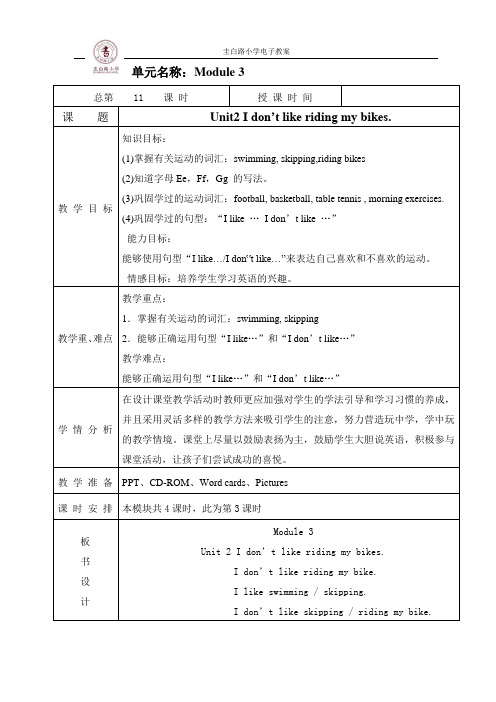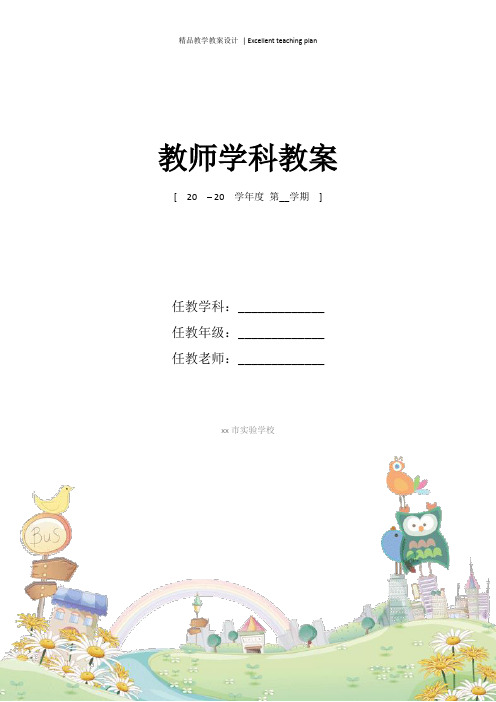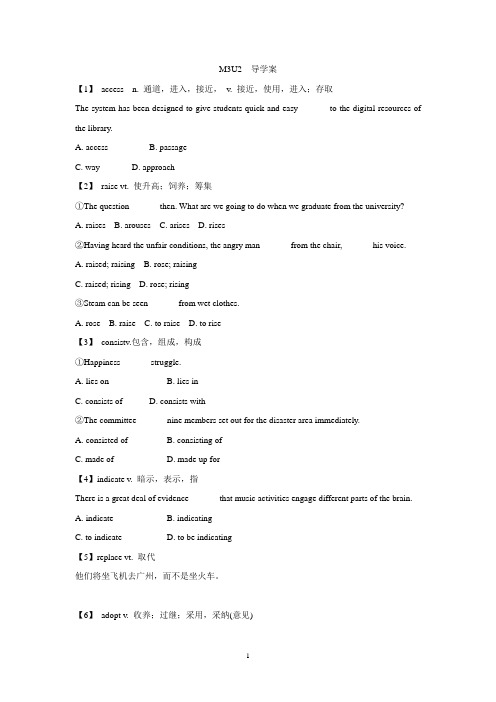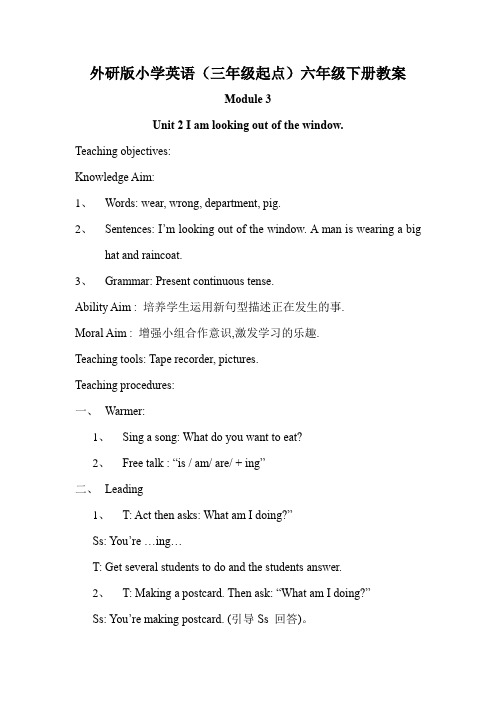M3U2++grammar+导学案(教师版)
- 格式:docx
- 大小:29.83 KB
- 文档页数:6

池州华佑高级实验中学人本跨界大课堂自主学习型英语学道堂组姓名编号M3 unit2(05) 日期2017-03- 19 主备校长备课组高一英语组【佳句欣赏】(大声朗读三遍):Do as the Romans do 入乡随俗。
【自研课导学】(时段:晚自习)预习内容及目标:认真研读课本P28-29内容,疑问词引导的定语从句。
【晨读课】 1. 听写P22 单词。
2. 大声朗读P22-23 课文。
【展示课导学】(一)学习内容:M3 Unit 2 Gramma r﹠usage 第五课时(二)学习主题:1.掌握疑问词引导的名词性从句。
2. 掌握名词性从句在句中充当的成分。
(三)定向导学·互动展示时段:晚自习时间:20’训练方式:独立,自主完成“日日清过关”巩固提升三级达标训练题姓名自评:师评:批阅日期:一、基础题翻译下列短语borrowed words show concern about ban sb. from doing sth.due to have/ get access to share…..with二、提高题名词性从句专项练习1. ________that they found an unusual plant in the forest.A. It is saidB. They are saidC. It saidD. It says2. _____ caused the accident is still a complete mystery.A. WhatB. ThatC. HowD. Where3. It worried Mary a lot _____ she would pass the college entrance examination.A. whetherB. ifC. thatD. how4. Shanghai has taken on a new look. It isn’t like _____ it used to be .A .what B. how C. that D. which5. ____ is no possibility ______ Bob will win the first prize in the match.A. There, thatB. It, thatC. There, whetherD. It, whether6. Little Tommy was reluctant to tell the schoolmaster ____ he had done the day before.A .that B. how C .what D. where7. The old man smiled when he saw how pretty _____ up to be during the past few years.A. had his daughter grownB. would his daughter growC. his daughter would growD. his daughter had grown8. Have you seen Mary lately? My boss wants to know _______.A. how she is getting alongB. how is she getting alongC. what she is getting alongD. what is she getting along9. ____surprised me most was _____such a little girl of seven could play the violin so well.A. That; whatB. What; thatC. That; thatD. What; what10. These wild flowers are so special I would do ______ I can to save them.A. whateverB. whichC. thatD. whichever11. _____ helped to save the drowning girl is worth praising.A. WhoB. AnyoneC. WhoeverD. The person12. Eat _____ you like and leave the others for _____ comes in late.A. any; whoB. every; whoeverC. whichever; whoeverD. either; whoever13. ____ she couldn’t understand was _____ fewer and fewer students showed interest in her lessons.A. What; whyB. That; whyC. What; becauseD. Why; that14. It was ____ he said ___ disappointed me.A. What; thatB. That; thatC. What; whatD. That; what15. It was ordered that all the soldiers _______to the front.A. should sendB. must be sentC. should be sentD. must go16. The true value of life is not in ______, but _______.A. which we get; what give weB. what we get; what we giveC. which do we get; what do we giveD. how we get; that we give17. We are all for your proposal that the discussion _______.A. be put offB. was put offC. should put offD. is to be put off18. Go and get your coat.It's ____ you left it.A. whereB. thereC. here whereD. where there19. Sarah hopes to become a friend of ______ shares her interests.A. anyoneB. whomeverC. whoeverD. no matter who20. You can’t imagine ______ when they received these nice Christmas pr esents.A. how they were excitedB. how excited they wereC. how excited were theyD. they were how excited【学生自主反思】(精题选编, 错题纠正, 今日一得等)今日心得:今日不足:【培辅课】(时段:附培辅单)疑惑告知:效果描述:。



M3U2 导学案【1】access n. 通道,进入,接近,v. 接近,使用,进入;存取The system has been designed to give students quick and easy ______ to the digital resources of the library.A. accessB. passageC. wayD. approach【2】raise vt. 使升高;饲养;筹集①The question ______ then. What are we going to do when we graduate from the university?A. raisesB. arousesC. arisesD. rises②Having heard the unfair conditions, the angry man ______ from the chair, ______ his voice.A. raised; raisingB. rose; raisingC. raised; risingD. rose; rising③Steam can be seen ______ from wet clothes.A. roseB. raiseC. to raiseD. to rise【3】consistv.包含,组成,构成①Happiness ______ struggle.A. lies onB. lies inC. consists ofD. consists with②The committee ______ nine members set out for the disaster area immediately.A. consisted ofB. consisting ofC. made ofD. made up for【4】indicate v. 暗示,表示,指There is a great deal of evidence ______ that music activities engage different parts of the brain.A. indicateB. indicatingC. to indicateD. to be indicating【5】replace vt. 取代他们将坐飞机去广州,而不是坐火车。

中学七年级下学期英语科导学案编号:11课题:Module 3 Unit 2 We’re going to cheer the players.Period 1 (A1—A2) 课型:读写课【学习目标】1. 知识目标:掌握本单元的重点单词、词组和句型的意思及用法。
(重点)2. 能力目标:通过听、说、读、写进一步学习be going to描述计划与安排的事情。
(难点)3. 情感目标:养成良好的、有计划的生活和学习习惯,培养自主学习能力。
【学习流程】一、预习(要求同学们课前完成,组长课前检查)1. 自学本单元的单词,在不会读的单词下做标记。
2. 做练习册M3 U2预习导航,看第二课要点直击。
3. 读课本P16 A1的单词,完成A1的人物与图匹配。
4. 预习检测,在课文中找出下列词组:⑴盼望⑵赢得比赛⑶玩得开心⑷散步⑸在五一的早晨⑹暑假⑺观光⑻与----交朋友⑼为球员加油⑽捡垃圾⑾参加夏令营5. 读课本P16完成A 2,在不理解的句子下做标记,试着完成A3后的问题。
二、交流、展示与点评1. 群学:把不会的新单词与组员交流,朗读展示。
2.小组讨论预习检测的答案,展示点评。
3.速读A1课文,把人物与图片搭配起来。
4.细读并完成A2的问题,组内交流并展示点评。
5.听录音或看录像跟读P16 A1的课文;全班齐读。
6.群学:分小组朗读课文;展示并点评。
三、合作探究:1. look forward to + n./ doing 意思是“期待,盼望”,to 是介词,后接名词或动名词。
如:I’m looking forward to Beijing. 我期待着去北京。
Tony 期待见到他的朋友。
Tony is looking forward to his friend.2. enjoy+ n. / doing (后接名词或动词的ing形式),如:Daming enjoys sports.常见搭配:enjoy oneself = have a goodtime = have fun(玩得开心)我喜欢读书。

外研版小学英语(三年级起点)六年级下册教案Module 3Unit 2 I am looking out of the window.Teaching objectives:Knowledge Aim:1、Words: wear, wrong, department, pig.2、Sentences: I’m looking out of the window. A man is wearing a bighat and raincoat.3、Grammar: Present continuous tense.Ability Aim : 培养学生运用新句型描述正在发生的事.Moral Aim : 增强小组合作意识,激发学习的乐趣.Teaching tools: Tape recorder, pictures.Teaching procedures:一、Warmer:1、Sing a song: What do you want to eat?2、Free talk : “is / am/ are/ + ing”二、Leading1、T: Act then asks: What am I doing?”Ss: You’re …ing…T: Get several students to do and the students answer.2、T: Making a postcard. Then ask: “What am I doing?”Ss: You’re making postcard. (引导Ss 回答)。
T: Today we’ll talk about postcard.三、Text teaching1、T: Show the pictures and listen. (twice)2、Ss: Underline the new words.3、T: Explain.4、Ss: Read the words and spell them.5、Game: Spell the words in groups work.6、Ss: Listen and read the text. Then Act it out.7、Learning the poem.四、Practice1、Talk about photos. (谈论正在发生的事。
外研社《新标准英语》衔接版八下Module 3 Journey to space Unit2 We have not found life on any other planets yet.the universe.3. Play the tape and let the students read.then complete the sentences with the correct form. In Act 4.Step 4 Post-reading1. Let the students discuss sth. about the solar system with the given words2. retell solar system.Eight planets go around the Sun.围绕airwaterlight Earth environmentThe earth : a planet---(go around)--- the sun: has good environment Other planets don’t have like that of …Step 5 Writing1. Let the students share what they talked about just now2.Let the students write a short passage about it .Step6. Summary discuss about the earth with the given words(,以动画图片结合思维导图的方式展示相关太阳系的内容,形象直观,让学生更好的理清思路,为复述做好准备。
)The Earth+ planets the sun +stars Milky Way universeRetell the solar system according to the route(根据动画及提示词,做好复述任务.)Do the writingSummarize the contentSummarize the content.Step7. Homework1. Remember the key words and phrases.2. Write the passage . Remember the key words and phrases.Write the passage .板书设计Module3 Journey to spaceUnit2 We have not found life on any other planets yet.there has been life on Earth for hundreds of millions of years.The Earth is a planet and it goes around the Sun. Seven other planets also go around the sun.None of them has an environment like that of the earthour solar system is a small part the Galaxy or the Milky Way. The Earth the sun Milky Way universe other planets stars课后记。
小学英语外研版(三起)四年级下册<<M3 U2 On Monday I’ll go swimming. >> 教学设计一、教材分析本课是新标准英语三年级起点第四册 Module 3 Unit 2 On Monday I’ll go swimming .是在第一单元的基础上继续巩固和学习将来时态will的使用,以及星期的学习,让学生们学会用英语来做一周计划。
二、教学目标:知识目标1学生基本能够听懂,会说,会读词汇:Sunday,Monday, Tuesday, Wednesday, Thursday, Friday, Saturday, help, homework2提供丰富多样的实践活动,让学生熟练掌握并运用“ I’ll do something 句型.”能力目标学生能熟练用I’ll…句型谈论自己一周的计划。
情感目标学生通过本课的学习懂得做事情一定要有计划性。
三、教学重难点重点:词汇:Sunday,Monday, Tuesday,Wednesday, Thursday, Friday, Saturday, help, homework句型:I’ll….难点:I’ll…句子中打算干的事情一定要跟原形。
四、教学方法情景教学法读图法五、教具准备PPT 、图片、点读笔六、教学过程Step 1 : Warming-up1、课前播放歌曲:Monday Tuesday…(学生可以试着跟唱)2、Greeting(设计意图:通过歌曲能使学生迅速进入英语学习的状态,师生间的相互问候能很好地拉近师生间的距离,为学生营造了很好的学习氛围。
)3、Look and say as quickly as you can .go swimming/read books/row a boat/fly a kite/ride a bike/play football /draw pictures…(设计意图:PPT快闪一些活动图片学生说图片这个活动一方面能调动学生的学习积极性另一方面也对前面学过的知识进行了复习,为更快进入课文主要内容的学习做好铺垫。
Module 3 HeroesUnit 2 _________There were few doctors,so he had to work very hard on his own.单位:_苏留庄镇中学初稿;季桂萍第二负责人:郭玉喜第一负责人:季桂萍阅读表达Dr Norman Bethune was born in 1890.He became a d octor in 1916 and went to Spain in 1936 to treat the wound ed sol diers during the war there. He soon realised that many peopl e were dying because they did not get to hospital quickly enough.Dr Bethune d evel oped new ways of taking care of the sick.(4)He invented special medical tools to use outsid e hospitals and cl ose to the fighting areas so that d octors coul d treat the wound ed more quickly.His inventions saved many lives.In 1938,Dr Bethune came to China and helped treat the wounded during the Anti-Japanese War.At that time ,there were few d octors,so he had to work very hard on his own.His experience of treating peopl e in Spain was useful in China.He d eveloped training courses for l ocal d octors and nurses,and wrote books so that they coul d l earn about how he treated the sick.Dr Norman Bethune often work very hard without resting or taking care of himself.Once,he even worked for sixty-nine hours without stopping and managed to save over a hundred lives.One day in 1939,he cut his finger during an operation_(3)_he continued his work without treating it.In the end,he died of his wound.1.What did Dr Norman Bethune d o in Spain in 1936?___________________________________________________2.What did Dr Norman Bethune invent to use outsid e hospitals?___________________________________________________3.在(3)处填上合适的连词,使句子更加连贯:________4.将文中画线部分(4)的英语句子翻译成汉语。
Module 3 My schoolUnit 2 Period 1课型读写课主编:叶丽芳参与编写老师:张金花、余春林、徐东兰、张瑜敏、李桂玉、李玉梅、郑文静编写年月日:2013-11- 下发时间: 2013-11- 使用时间:2013-11-知识目标: 1、能听、说、读、写P16-17的新词汇;2、能用there be 句型进行表达句子。
技能目标:1、能读懂别人的介绍;2、能用“there be…”句式对作简短介绍;3、能用“and”来衔接句子。
情感目标:在小组活动中能与其他同学积极配合和合作;能迎难而上。
策略目标:能预习;能积极与他人合作;遇到问题能向老师或同学请教。
一、知悉陌生的课堂用语:Label the pictures with the words and expressions from the box.(用方框的单词和表达在图画中标识出来)Label the map of the school. (标识出这所学校)Read after the tape (跟磁带读). Do exercises. (做练习)二、试读课本P16-17的新单词。
三、在课本P17里划出含有P17新单词的短语或句子(短语优先),借助练习册《同步导学与优化训练》P32或课本P79了解你划了线的句子的中文意思。
四、完成课本P16 1 (Label the pictures with the words and expressions from the box.)五、积极主动记录自己的预习情况,方便上课与小组同学讨论学习哟。
不会拼读的词汇:___________________________不明意思的短语或句子:____________________________不会运用的词汇:____________________________听、说、读、写P16-17的新词汇; 2、能用there be 句型进行表达句子。
江苏省栟茶高级中学高一英语导学案 编写:孙利 审核:袁再明 M3U2 Language Grammar and usage 名词性从句 一、连接词引导的名词性从句 1. what, which, who ,whom, whose等连接代词和when, where, why, how等连接副词可引导主语从句、宾语从句、表语从句及同位语从句。 1)主语从句 Who will win the match is still unknown. 谁将赢得这场比赛还不得而知。 Where a person comes from will affect his or her style of speech. 一个人来自哪儿会影响他(她)说话的方式。 2)宾语从句 You can begin to see why English has such strange rules! 你会开始明白为什么英语有如此奇怪的规则! He always thinks of how he can work better. 他总是在想怎样能把工作做得更好。 3)表语从句 This is where our problem lies. 这就是我们的问题所在。 This is why English has so many difficult rules that confuse people. 这就是为什么英语有如此多的让人迷惑的难的规则。 4)同位语从句 I have no idea when he will come back home. 我不知道他什么时候回家。 We haven’t got the news where the meeting will be held. 会议将在哪儿召开,我们还没有得到消息。 2. 名词性从句的语序 名词性从句总是用陈述语序,特别是当名词性从句由“疑问词”引导时,要注意不得使用倒装语序。 What are people from the north saying? →People from the south find it difficult to understand. = People from the south find it difficult to understand what people from the north saying. 3. 主谓一致问题 当主语为从句时,谓语动词一般使用单数形式;但当what引导主语从句且主句为“主系表”结构时,谓语动词单复数通常根据表语而定。 What we need now is more time. 现在我们需要的是更多的时间。 What we need now are more workers. 现在我们需要的是更多的工人。 4. 连接代词that与what的选择 1)that 和 what 都可引导所有的名词性从句。但是,what除起连接作用外,还在名词性从句中充当成分(主,宾,表)。而that在名词性从句中不充当任何成分,只起连接作用。 1.What he wants is a book. 2. That he wants to go there is obvious. 3.The result is that we won the game. 4.This is what we want to know. 5.Is what he told us true ? 6.We should pay attention to what the teacher is saying. 7. I have no doubt that he will come. 8. I have no idea what he did that afternoon. 2)选择that还是what主要取决于从句结构是否完整。 He has told me that he will go to Shanghai tomorrow. 他已经告诉我他明天要去上海。(that江苏省栟茶高级中学高一英语导学案 编写:孙利 审核:袁再明 引导宾语从句,其本身无实际意义。) What he wants to tell us is not clear. 他要跟我们说什么,还不清楚。(what引导主语从句且在从句中充当tell的宾语) 5.连接代词与连接副词的选择 1)连接副词when,where, why, how 等引导名词性从句时在从句中做状语。 2)选择that还是连接副词主要取决于主句的逻辑意义。 I didn’t know that she got angry at what I said. 我不知道她因我所说的而生气了。 I didn’t know why she got angry at what I said, because I was just telling the truth. 我不知道她为什么对我所说的生气,我只是实话实说而已。 6. 连接代词that的省略 1) 单个宾语从句中的that可省略 We all know (that) the sun rises in the east. 2) 在“主+谓+it(形式宾语)+宾补+that从句(真正宾语)”的句型中不省略 We must make it clear that we agree to the arrangement. 3)两个并列的宾语从句, 第一个that可以省略,第二个that 不可省略. He told me( that) he would come and that he would come on time. 4)当宾语从句做介词宾语时,that不可省略。 I know nothing about him except that he is from the south. 7. 同位语从句与定语从句 1)能接同位语从句的名词有:fact, truth, information,news, idea, belief, hope, conclusion, problem, wish, promise, doubt, possibility, evidence, order, demand, desire, requirement, suggestion, advice ,proposal等。其中表示“命令、要求、建议”的名词后的同位语从句要用虚拟语气,其结构为sb./sth. (should) do sth.或sth (should) be done。 他提出建议运动会推迟。 He came up with the suggestion that the sports meeting be put off. 2)同位语从句常用 that 引导,也可根据含义选用when / where /why / how / whether 等疑问词来引导。 他提出一个问题运动会什么时候举行。 He raised a question when the sports meeting would be held. 3)同位语从句与定语从句的区别: We are excited at the news that we won the game. We are excited at the news that our teacher told us. 小结:1)定语从句是对先行词的修饰,它不涉及先行词的具体内容。同位语从句对中心词的内容作进一步的解释说明,表明中心词的具体内容。 2)定语从句中that不但起连接作用,而且在定语从句中充当成分,且充当宾语时可省略。引导同位语从句的that在同位语从句中不充当任何成分,只起连接作用,无具体含义,且不可省略。 8.易错题精练 1)I want to be liked and loved for _C__ I am inside. A. who B. where C. what D. how 2) The boss was so angry and spoke so fast that none of us understood _D__ he said meant. A. that B. what C. that that D. what what 3) “Is _D__ you want to say?”asked the teacher. A. this B. that C. all that D. that all 4) ---What were you trying to prove to the police? 江苏省栟茶高级中学高一英语导学案 编写:孙利 审核:袁再明 ---_C__ I was last night. A. That B. When C. Where D. What 5) ___ she couldn’t understand was _A__ fewer and fewer students showed interest in her lessons. A. What; why B. That; what C. What; because D. Why; that
二、形式主语it 1. 当主语从句,动词不定式和动名词作主语时,通常在句首使用形式主语it,而将真正的主语置于句末。 1)代替主语从句 That we would not be able to understand Old English today is certain. =It is certain that we would not be able to understand Old English today. 现在,我们肯定不能理解古英语。 Whether English will keep on changing in the future is easy to answer. =It is easy to answer whether English will keep on changing in the future. 未来英语是否会继续变化,这个问题很容易回答。 2)代替动词不定式 To learn a foreign language is a challenging task. =It is a challenging task to learn a foreign language 学习一门外语是一项具有挑战性的任务。 To gain access to the Internet is important for us. =It is important for us to gain access to the Internet. 能够上网对我们来说很重要。 3)代替v-ing形式 Wandering in the countryside is fun. =It is fun wandering in the countryside. 在乡村漫步很有趣。 Travelling to Beijing takes up a lot of my time. =It takes up a lot of my time travelling to Beijing. 去北京旅行占了我很多时间。 注意:在It is no good/It is no use之后通常使用v-ing作真正的主语。 It is no use crying over the spilt milk. 覆水难收。 2. it用在seem, appear, happen, turn out, prove等词前面充当句子的形式主语。 It seems that he is enthusiastic about drawing. =He seems to be enthusiastic about drawing. 他似乎对绘画很热衷。 It happens that my new neighbor comes from my hometown. =My new neighbor happens to come from my hometown. 我的新邻居碰巧来自我的家乡。 3. it用于“It+be+过去分词+主语从句”的句型中;常见过去分词有:announced, believed, expected, hoped, decided, reported, said, shown等。 It is said that a well-known host will come to our school. =A well-known host is said to come to our school. 据说一位著名主持人将来我们学校。 巩固提升